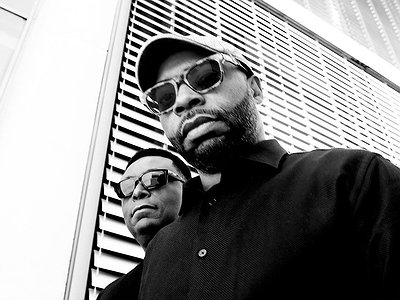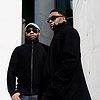Could you take us through a day in your life, from a possible morning routine through to your work? Do you have a fixed schedule? How do music and other aspects of your life feed back into each other - do you separate them or instead try to make them blend seamlessly?
We don’t have a consistent day to describe, because each and everyone is completely different in what we do. Mainly, because of how much touring that we do in any given year our schedules are constantly changing. Sure, at some point our lives do intersect and feedback into each other, we don’t try to separate cause separating would cause too much work and also eat up too much time … we roll with them an enjoy each and every moment as they come.
Could you describe your creative process on the basis of a piece or album that's particularly dear to you, please? Where did the ideas come from, how were they transformed in your mind, what did you start with and how do you refine these beginnings into the finished work of art?
No, sorry:) That process is truly one that is a deep feeling and we just can’t give it a description to or try to explain, it’s something that’s just part of who you are and just surfaces when needed. But the ideas for our current album Endustry came from the fact that we wanted a piece of work that expressed how we feel when we go about our tour schedule (city to city and country to country) so that audibly you follow us on our journey through our lives on the road. Starting from the drums, which is the pulse of our works, we explored various rhythms as we performed and paid attention to how our audiences followed them. That gave birth to other experimentations with the element of sounds and these sounds of course, completed our process and brought it into life.
There are many descriptions of the ideal state of mind for being creative. What is it like for you? What supports this ideal state of mind and what are distractions? Are there strategies to enter into this state more easily?
Yea, some folks do talk about that ideal state of mind to create, for us though, we actually live in the state. We don’t really feel the need to try to reach a certain mode to create in, we actually get to the point where we must create, as a release for us on a personal level … it’s like breathing and it just happens. You don’t sit down and tell yourself to breath, it happens naturally and thus, our creative state of mind is just like that for us too!
How is playing live and writing music in the studio connected? What do you achieve and draw from each experience personally? How do you see the relationship between improvisation and composition in this regard?
As dance music artists, we picture how a composition will be received in the club or at a festival. In the early part of our careers, we imagined a DJ playing the track, now we picture ourselves playing it. We compose more like a band and less like solitary producer. Maybe there isn’t a drummer or guitarist involved, but we do fall into different and distinctive roles in the studio.
Once a track is composed and added to the live set, that’s when we improve with it. New arrangements, drops and fills, and things are evolved during the live set. When things go over live really well, we tend to unconsciously repeat and further evolve the movements. Many of these things are translated to the final production.
How do you see the relationship between the 'sound' aspects of music and the 'composition' aspects? How do you work with sound and timbre to meet certain production ideas and in which way can certain sounds already take on compositional qualities?
With electronic music in particular, many compositions only work because of the sound that’s being played. Play the same arrangement on a piano, and it may sound like complete rubbish. Some tracks are composed around a sound that has been previously created. Some patches are written based on a sequence that has already been recorded. The relationship of sound to composition and composition to sound is undeniable.
There maybe long and tedious hours involved in process of making a patch fit for a production or just sometimes it just needs a bit of tweaking. Making it fit “just right” in the mix can involve shaping the patch on the synth or drum machine, eqing (subtractive then additive), and adding various effects for sound shaping, and finally effects for mix purposes.
Some sounds react to playing by adding additional timbres, morphing, or modulating. These various things can completely make a composition by adding movement that was not actually played.
Our sense of hearing shares intriguing connections to other senses. From your experience, what are some of the most inspiring overlaps between different senses - and what do they tell us about the way our senses work? What happens to sound at its outermost borders?
All of the senses do share there own sense of intrigue, but the one of hearing is of course our favorite without a doubt:) Our experience tells us how wonderfully we are made and that the thought behind our very creation is second to none, we were created to enjoy life. Just think about how when we open our eyes, there’s already a picture there, rub our hands over something and without visually being able to see it we can tell its texture, take a deep breath and tell if we’re by the seaside or what’s being prepared for dinner, placing something in your mouth and being able to detect if its sweet, sour, bitter or salty. But sound can touch emotions of anger, sadness, happiness and joy. It can trigger your mind to think back to a particular time period or advance it into the future and can very easily put you at ease. It’s truly amazing what hearing can do as a sense. Don’t really know what sound does at its most outer borders, but don’t really care either! Sometimes things can be overthought, just enjoy the experience and pleasure that it brings:) !
Art can be a purpose in its own right, but it can also directly feed back into everyday life, take on a social and political role and lead to more engagement. Can you describe your approach to art and being an artist?
Art for us, either moves or intrigues us! We don’t understand really what an approach to being an artist is … the question seems more than a bit foreign to us.
It is remarkable, in a way, that we have arrived in the 21st century with the basic concept of music still intact. Do you have a vision of music, an idea of what music could be beyond its current form?
From the earliest writings of music existence, music has been a form of rejoicing, power, and or praise amongst other emotions expressed by it. It’s music, it moves us in one way or another from the beginning till now … what else should it do?



